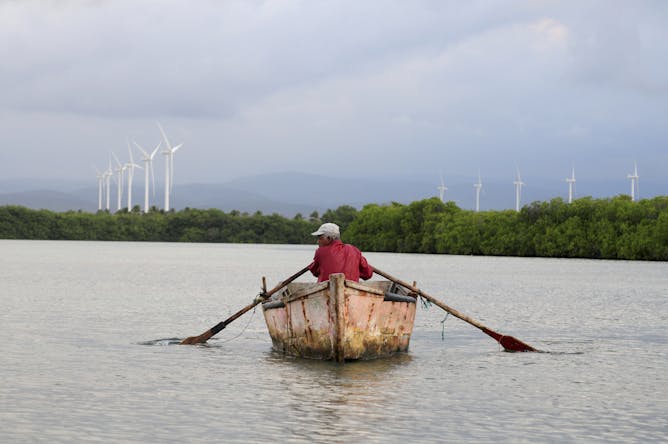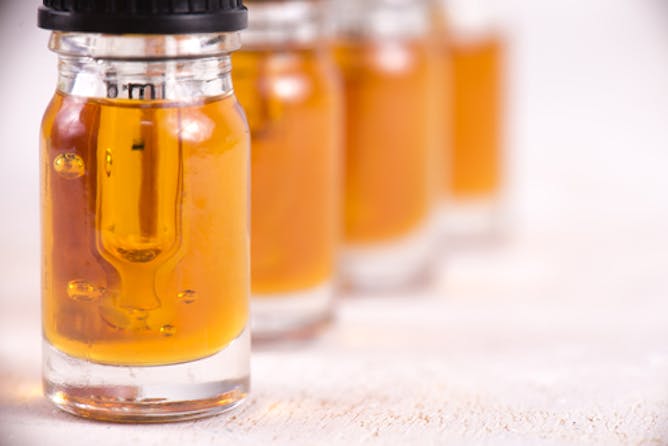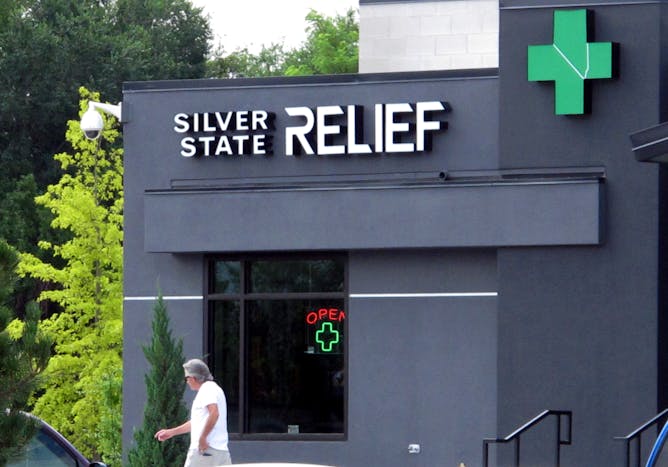| |
|
|
|
|
|
|
| |
|
Editor's note
|
|
Puerto Ricans were plunged into darkness again on April 18, seven months after Hurricane Maria first knocked out electricity. The island’s prolonged blackout highlights the urgent need for Caribbean countries to make their fragile, outmoded power grids more resilient by integrating clean energy sources like solar and wind. But climate change will complicate the region’s transition into renewables in unpredictable ways, writes Masaō Ashtine of the University of the West Indies in Jamaica.
An FDA panel on Thursday unanimously approved a drug made from CBD, which is derived from cannabis, to treat two forms of epilepsy. Drake University pharmacy professor Timothy Welty explains why we shouldn’t expect other drugs with CBD, at least any time soon.
And Frank Nuessel explores the linguistic nuances of how marijuana dispensaries are advertising themselves. What happens when a drug subculture rich in slang goes mainstream and must be seen as a serious enterprise?
|
Catesby Holmes
Global Affairs Editor
|

|
|
Top story
|

Rising seas, harsher weather, rainier days. The impacts of climate change make it harder for Caribbean countries to plan their transition toward renewable energy sources.
Ricardo Rojas/Reuters
Masaō Ashtine, University of the West Indies, Mona Campus
The 2017 hurricane season showed that Caribbean nations urgently need more resilient power grids. But the effects of climate change – including more severe storms – complicate the shift to renewables.
|

Small vials of CBD, which some believe could be a cure for many ailments.
Roxana Gonzalez/Shutterstock.com
Timothy Welty, Drake University
A drug made from a molecule produced from cannabis gained unanimous approval from an FDA panel. But the molecule, CBD, is decidedly different from some other ingredients in cannabis: It doesn't result in a high.
|

Pharmacy or marijuana dispensary?
Scott Sonner/AP Photo
Frank Nuessel, University of Louisville
Marijuana has a rich linguistic tradition. But drive by dispensaries like 'Advanced Medical Alternatives' or 'Alameda Wellness Center,' and you might think you’re passing the office of a physical therapist.
|
|
|
|
|
Environment + Energy
|
-
Bill Ritter, Jr., Colorado State University
A recent survey of electric utility leaders finds that Trump administration efforts to promote coal energy and roll back air pollution regulations have had little impact on their long-range plans.
-
A.R. (Ravi) Ravishankara, Colorado State University
Earth's ozone layer shields us from harmful ultraviolet radiation. Nations have been working to reduce ozone-depleting chemicals since the 1980s, but recent studies show that there is still work to do.
|
|
Politics + Society
|
-
Prentiss A. Dantzler, Colorado College
Where people live in the US is still often influenced by racial discrimination. Is the federal government doing enough to carry out the vision of the civil rights era legislation?
-
Raymond La Raja, University of Massachusetts Amherst
The Democratic Party is a mishmash of causes and interest groups. The party's future will be determined by how its leaders balance and align the interests of its diverse factions.
|
|
|
|
From our International Editions
|
-
Garth Frazer, University of Toronto
The top U.S. foreign policy goals in Africa evidently no longer relate to human rights or democratic freedoms, but to protecting tiny, marginal American industries.
-
Diatyka Widya Permata Yasih, Universitas Indonesia; Andi Rahman Alamsyah, Universitas Indonesia
Drivers for online ride-hailing services face several social conditions that may challenge their efforts to transform collective action into a solid union.
-
Josh Stenberg, University of Sydney
Dream of the Red Chamber, by Cao Xueqin, follows the travails of a pubescent boy. Somehow, through the spats, crushes and rivalries of a handful of teenagers, the great questions of the human condition are broached.
|
|
|
|
| |
| |
|
|
|
|
|
|
|
|